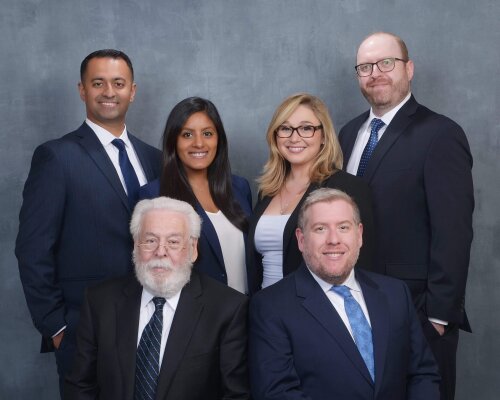Best Work Injury Lawyers in Philadelphia
Share your needs with us, get contacted by law firms.
Free. Takes 2 min.
List of the best lawyers in Philadelphia, United States
About Work Injury Law in Philadelphia, United States
Work injury law in Philadelphia is governed primarily by Pennsylvania state workers' compensation law, which provides no-fault benefits to employees who are injured on the job or who develop a work-related illness. No-fault means that most injured workers can recover medical care and wage-loss benefits without proving their employer was negligent. Employers in most industries are required to carry workers' compensation insurance, and insurers or self-insured employers provide benefits under rules administered by the Pennsylvania Bureau of Workers' Compensation.
Common types of workplace injuries include slips and falls, repetitive stress injuries, injuries from machinery, motor vehicle accidents that occur during work, and occupational illnesses from exposure to hazardous substances. Benefits may include payment for reasonable and necessary medical treatment, partial wage replacement while you cannot work, temporary or permanent disability benefits, vocational rehabilitation in some cases, and death benefits for eligible survivors.
Why You May Need a Lawyer
Many workplace injury claims are handled without a lawyer, but there are frequent situations where legal help is important. You may need a lawyer if your employer or insurer denies your claim or delays payment of benefits. A lawyer is useful when there is a dispute about the cause of your injury, the extent of your disability, or the appropriate medical treatment. Complex medical issues, permanent impairment ratings, requests for lump-sum settlements, and cases involving catastrophic injury or death often require professional advice.
Other reasons to consult an attorney include potential third-party claims where someone other than your employer was negligent, claims against uninsured employers, retaliation or discrimination after filing a claim, and disputes over return-to-work accommodations or vocational rehabilitation. A workers' compensation lawyer can evaluate your case, explain your rights, represent you before workers' compensation judges, and negotiate with insurers to protect your financial and medical interests.
Local Laws Overview
Key legal features relevant to workplace injuries in Philadelphia and Pennsylvania include the following points:
- Governing law - Pennsylvania Workers' Compensation Act sets the rules for coverage, benefits, and procedures for dispute resolution.
- No-fault benefits - Most injured workers can obtain medical care and wage-loss benefits regardless of fault, subject to eligibility rules and statutory limits.
- Employer obligations - Most employers must maintain workers' compensation insurance. Employers who fail to carry insurance may face penalties and may expose themselves to direct liability.
- Medical care - The workers' compensation system governs who pays for and authorizes medical treatment. In practice, insurers or employer-selected providers may manage initial care, but disputes over treatment and provider choice can arise.
- Disability benefits - Temporary total, temporary partial, and permanent disability benefits are available depending on medical restrictions and ability to earn wages. The amount and duration are calculated under statutory formulas.
- Third-party claims - Injured workers may also bring separate negligence claims against third parties who contributed to the injury. Recoveries from third parties can be offset by workers' compensation benefits under certain rules.
- Appeals and hearings - Disputes are handled administratively through workers' compensation judges, and further appeals go to the Workers' Compensation Appeal Board and state courts. Timely filings and compliance with procedural rules are critical.
- Anti-retaliation protections - State law prohibits employers from retaliating against employees for filing workers' compensation claims, subject to specific legal standards for proving retaliation.
Frequently Asked Questions
How do I report a work injury in Philadelphia and who should I tell first?
Report the injury to your supervisor or employer as soon as reasonably possible and follow your employer's internal reporting procedures. Seeking prompt medical attention is important for your health and for documenting the injury. Keep a copy of any written reports and notes about verbal reports, including dates, times, and witnesses.
Will I lose my job for filing a workers' compensation claim?
Federal and state laws protect many workers from retaliation for filing a legitimate workers' compensation claim. However, disputes about whether adverse employment actions were lawful do occur. If you believe you were disciplined, demoted, or fired because you filed a claim, you should consult an attorney promptly to evaluate a potential retaliation claim.
What benefits am I entitled to under workers' compensation?
Typical benefits include payment for reasonable and necessary medical treatment related to the injury, payment for a portion of lost wages while you are medically unable to work, benefits for permanent impairment when applicable, and death benefits for eligible dependents. The exact amounts and eligibility rules are set by statute and depend on your wages, the nature of the injury, and medical evidence.
Can I choose my own doctor for a work-related injury?
Procedures for choosing a doctor can vary in practice. In many cases the employer or insurer controls initial medical care and may provide a list of authorized providers. If you have disputes about choice of doctor, quality of care, or whether treatment is work-related, discuss these issues with an attorney who is familiar with Pennsylvania workers' compensation rules.
What should I do if my workers' compensation claim is denied?
If your claim is denied, do not assume the process is over. Request a written explanation, keep records of all medical treatment and communications, and consider contacting a workers' compensation attorney. You generally have the right to file a petition for benefits and request a hearing before a workers' compensation judge to challenge the denial.
Can I sue my employer outside of workers' compensation?
In most situations the workers' compensation system provides the exclusive remedy against an employer for work-related injuries, which means you cannot sue your employer in civil court for negligence. There are limited exceptions, such as intentional torts or certain employer conduct that falls outside the protection of the workers' compensation statute. You may also pursue third-party lawsuits against parties other than your employer.
What is a third-party claim and when should I consider it?
A third-party claim is a separate lawsuit against a non-employer whose negligence contributed to your work injury, such as a property owner, equipment manufacturer, or outside contractor. You should consider a third-party claim when another party’s negligent act or product caused or worsened your injury because recoveries from third parties can provide compensation that is not available through workers' compensation alone.
How long do I have to file a workers' compensation claim?
Deadlines and procedural requirements vary and can be strict. Timely notice to your employer and timely filing of petitions with the workers' compensation system are important. Because rules and deadlines can differ depending on the type of injury and facts involved, contact a knowledgeable attorney or the Bureau of Workers' Compensation to understand the deadlines that apply to your situation.
Will my workers' compensation benefits affect my Social Security or disability claims?
Workers' compensation benefits can interact with Social Security Disability Insurance and other benefits. In some circumstances Social Security benefits may be reduced by workers' compensation or public disability benefits, while in other cases you can receive both. A lawyer who handles both systems or an experienced benefits counselor can help you understand how one benefit may affect another.
How much will a lawyer cost and how are fees handled?
Many workers' compensation attorneys work on a contingency basis, meaning they are paid a fee only if they recover benefits for you. Contingency fee arrangements are regulated and typically require court approval for certain fee percentages. Discuss fees, costs, and billing practices with any lawyer before you retain them so you understand how fees are calculated and what expenses you may be responsible for.
Additional Resources
When seeking information or help with a workplace injury in Philadelphia, consider these resources and agencies for guidance and assistance:
- Pennsylvania Bureau of Workers' Compensation - administers the state workers' compensation system and provides information on claims processes and forms.
- Federal Occupational Safety and Health Administration - enforces federal workplace safety standards and investigates some workplace hazards.
- Pennsylvania Department of Labor and Industry - provides information about labor laws, unemployment, and related worker protections.
- Philadelphia Commission on Human Relations - handles complaints about workplace discrimination and retaliation in certain circumstances.
- Local legal aid organizations and pro bono clinics - can provide low-cost or free legal help to eligible workers who cannot afford private counsel.
- Labor unions and employee representatives - if you are a union member, your union can be a resource for representation and guidance after a work injury.
- Medical providers who specialize in occupational medicine - can evaluate and document work-related injuries and advise on treatment plans relevant to claims.
Next Steps
If you have suffered a workplace injury in Philadelphia, take the following practical steps to protect your health and legal rights:
- Seek medical attention immediately - get necessary care and have the provider document that the injury is work-related.
- Notify your employer - follow your employer's reporting procedures and keep a written record of the report, including dates and witness names if possible.
- Preserve evidence - keep records of accident reports, photos of the scene, contact information for witnesses, medical records, pay stubs, and any correspondence with your employer or insurer.
- Keep written notes - document conversations and decisions about return-to-work status, accommodations, and communications with the insurer.
- Consider legal help - consult a workers' compensation attorney if your claim is denied or disputed, for complex injuries, or if you need help evaluating settlement offers or third-party claims. Many attorneys offer free initial consultations and work on contingency.
- Follow administrative procedures - if necessary, file petitions and attend hearings within the deadlines set by the Bureau of Workers' Compensation and be prepared to present medical and employment evidence.
Taking prompt, organized steps after a work injury improves your chances of getting the medical care and benefits you need. When in doubt, consult a qualified attorney or one of the public resources listed above to protect your rights and pursue the appropriate claims.
Lawzana helps you find the best lawyers and law firms in Philadelphia through a curated and pre-screened list of qualified legal professionals. Our platform offers rankings and detailed profiles of attorneys and law firms, allowing you to compare based on practice areas, including Work Injury, experience, and client feedback.
Each profile includes a description of the firm's areas of practice, client reviews, team members and partners, year of establishment, spoken languages, office locations, contact information, social media presence, and any published articles or resources. Most firms on our platform speak English and are experienced in both local and international legal matters.
Get a quote from top-rated law firms in Philadelphia, United States — quickly, securely, and without unnecessary hassle.
Disclaimer:
The information provided on this page is for general informational purposes only and does not constitute legal advice. While we strive to ensure the accuracy and relevance of the content, legal information may change over time, and interpretations of the law can vary. You should always consult with a qualified legal professional for advice specific to your situation.
We disclaim all liability for actions taken or not taken based on the content of this page. If you believe any information is incorrect or outdated, please contact us, and we will review and update it where appropriate.












